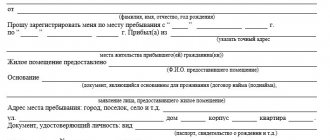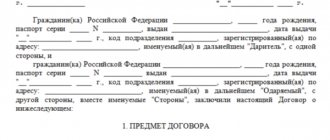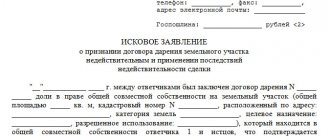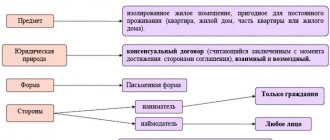The responsible tenant in a municipal apartment is the person who decides to rent the apartment.
His responsibilities are to pay rent and utilities. Without his consent, no transactions with the apartment can be carried out, i.e. register someone, discharge someone, do a redevelopment, purchase and sale. He is the direct owner of this apartment, this applies to municipal housing.
Responsible tenant, his rights and obligations:
| Rights | Responsibilities |
| move into someone else's home | use of housing that is provided exclusively for its intended purpose |
| rent out an apartment | |
| allow temporary persons to live in housing | The tenant undertakes to ensure that the housing remains safe |
| exchange/replace your home | make payments for utilities and housing within the required time frame |
| demand that utilities be provided on time, carrying out repairs in an apartment building |
Who is a responsible tenant in public housing?
In the USSR, citizens who were granted the right to use state or municipal residential premises were sent a warrant indicating the name of the responsible person with the ensuing rights and obligations (Article 47 of the RSFSR Housing Code, no longer in force). He was called a responsible tenant.
With the introduction of the modern Housing Code of the Russian Federation, the concept of a responsible tenant disappeared from the legislation, and the user of the residential premises became a tenant under a social tenancy agreement (how to conclude or terminate this agreement?).
Features of hiring social housing are reflected in Chapter. 8 Housing Code of the Russian Federation. The tenant acts as the applicant under the contract, appears in the title documents, and is also responsible for the maintenance of the residential premises and pays for utility bills. Family members living together with the employer have equal rights and obligations with him (Clause 2 of Article 69 of the Housing Code of the Russian Federation). The list of residents is reflected in the contract (clause 3 of article 69 of the Housing Code of the Russian Federation). We wrote in more detail about how residential premises are provided and used under a social tenancy agreement separately.
In the case of privatization of social housing, the tenant is recognized as the owner. On this basis, the right to perform legal actions with property arises in the form of:
- alienation;
- providing for rent;
- redevelopment;
- donations;
- barter;
- or sale (A. 2, Article 209 of the Civil Code of the Russian Federation).
The responsible tenant in a privatized apartment is not responsible for the maintenance of the residential premises to state and municipal authorities, and also does not notify about changes in living conditions and the list of residents in the part that is regulated by the social contract.
A tenant of privatized housing becomes a landlord when renting out premises to another person (Article 675 of the Civil Code of the Russian Federation). The tenant is liable to the owner on the basis of the rental agreement, taking into account the provisions of Chapter. 35 Civil Code of the Russian Federation.
For what reasons does the employer change?
There are many reasons why it is necessary to change the responsible tenant in a municipal apartment, for example:
- The current tenant has moved out of the apartment. For example, a married couple with a child lived in the apartment. The tenant was the father of the family. The couple divorced, the ex-husband moved out, leaving housing to his ex-wife and child. The new employer in this situation will be the ex-spouse.
- The current employer has been convicted and is serving a sentence in prison.
- It often happens that the responsible tenant changes due to the death of the current one - after the death of the person in whose name the social tenancy agreement is concluded, the members of his family registered in the housing retain the opportunity to use it, but do not automatically inherit the status of the tenant. The answer to the question of how to re-sign the responsible tenant: re-register the social security to another person, for example, to one of the adult heirs living in the apartment.
How do I file a claim to become the primary employer?
To re-register the contract for another family member, you must contact the housing fund, local government or state authority (the lessor under the contract), having previously obtained the written consent of the residents. The basis for re-registration of the contract is the application of the person who becomes the tenant.
In the event of an unlawful refusal to fulfill the applicant’s demands, it will be necessary to apply to the district court at the place of residence of the tenant or location of the landlord (Articles 24, 28 of the Code of Civil Procedure of the Russian Federation) with a statement of claim.
How to properly file a claim in order to file it and become an employer:
- name of the court;
- the plaintiff's full name and address;
- name and address of the organization acting as the defendant;
- residential address;
- full name of the current responsible tenant;
- full names of residents;
- an indication of an appeal to the defendant with a request to be recognized as an employer on the basis of a mutual agreement with the residents (on other grounds);
- the date of the defendant’s refusal to comply with the requirements or the period of inaction;
- request to oblige the defendant to recognize the plaintiff as an employer on the basis of Art. 82 Housing Code of the Russian Federation;
- request to oblige the defendant to renew the contract;
- indication of the details of the social tenancy agreement (number, date of conclusion);
- a list of documents in the Appendix confirming the plaintiff’s arguments and competence.
We do not recommend completing the documents yourself. Save time - contact our lawyers by phone:
8 (800) 302-76-94
The document is dated and certified by the signature of the plaintiff.
The following must be attached to the claim:
- a copy of the social tenancy agreement;
- a copy of the statement of consent of family members;
- an extract from the house register;
- financial account statement;
- receipt of payment of state duty;
- a copy of the defendant's statement of claim.
A copy of the statement of claim is sent to the legal address of the defendant with acknowledgment of delivery.
Re-registration
After the death of the tenant, the municipal apartment will have to be re-registered by drawing up a new DSN. In accordance with the legislation of the Russian Federation, a person is selected who has the right to such registration: the choice is made exclusively among family members living in a given living space or persons who have received a privileged right through the court.
The procedure for registration and the rights of residents are specified in Article 82 of the Housing Code. It is especially noted there that if any citizen who uses housing on the basis of the DSN, decides to start a family with a person living in another living space, he can apply for a common DSN for any of the registered family members. Any of the residents can replace the first tenant if he is legally capable (the consent of all other residents in this living space is required), but this requires the consent of the owner of the housing (department or municipality).
Rights and obligations of a person living under a social tenancy agreement
The rights and obligations of the employer are regulated by Art. 67 Housing Code of the Russian Federation. Tenants under a social tenancy agreement have the right to:
- moving family members or other persons into the premises;
- partial or complete sublease of residential premises in accordance with Art. 76-79 Housing Code of the Russian Federation;
- settlement of temporary residents in accordance with Art. 80 Housing Code of the Russian Federation;
- exchange or replacement of residential premises in accordance with Art. 72-75 Housing Code of the Russian Federation.
The period of residence of temporary residents cannot exceed six months (Clause 2, Article 80 of the Housing Code of the Russian Federation). The check-in of temporary residents into an apartment is lawful with the consent of the remaining residents and the landlord (Clause 1 of Article 80 of the Housing Code of the Russian Federation).
Responsibilities of the responsible tenant:
- use of the premises for their intended purpose;
- ensuring the safety of housing and property;
- maintaining housing in proper condition;
- carrying out repair activities;
- timely payment of utility bills;
- informing state or municipal authorities about changes in the terms of the contract.
Capable family members living together with the employer bear joint liability (clause 2 of article 69 of the Housing Code of the Russian Federation). If the resident has ceased to be a member of the family, but has not vacated the premises, he is liable individually on the basis of a separate agreement (clause 4 of article 80 of the Housing Code of the Russian Federation, clause 30 of the resolution of the Plenum of the Supreme Court of the Russian Federation No. 14 of 07/02/2009).
Can it be prescribed without consent?
Whether an employer can register without the consent of those registered is discussed below. The right to move citizens into social housing is regulated by sub-clause. 1 clause 1 art. 67 Housing Code of the Russian Federation. Based on Art. 70 of the Housing Code of the Russian Federation, an employer has the right to register members of his family only with the consent of the residents. If a minor child is registered, consent is not required.
For registration of citizens who are not family members, additional consent of the landlord is required. Permission to register may be refused if the occupied area per each family member becomes less than the registration norm.
If one or more residents are temporarily absent, their consent is also required. Registration entails a change in the terms of the contract and the list of residents, which requires its adjustment by the Housing Department.
Can I deregister without consent?
Read on to find out whether a tenant can check out without consent. Based on the provisions of Art. 35 of the Housing Code of the Russian Federation, as well as paragraph 31 of Government Resolution No. 713 of July 17, 1995, a registered tenant can be discharged without his consent on the basis of a court decision. The court must establish that the citizen has lost the right to use residential premises, is evading the fulfillment of maintenance obligations, or has been declared dead or missing. Eviction entails a change in the terms of the contract, which requires notification to the landlord.
Whom to appoint
The answer to the question of how to become a responsible tenant in a municipal apartment is simple - you need to become a party to the social tenancy agreement. Adult, capable citizens from among the family members of the citizen who left the property have the right to act as employers.
In addition, since participation in a social rent agreement involves payment of a certain amount to the homeowner, an adult able-bodied citizen should be appointed as the tenant.
If there are several such citizens, before changing the responsible tenant in a municipal apartment, a decision should be made within the circle of existing tenants about who it will be. After all family members living in the apartment come to an agreement on this issue, an application is submitted to the owner.
Changing the main tenant in a non-privatized apartment
If the conditions of the law are met, residents have the right to demand a change in the responsible tenant with the re-issuance of the social tenancy agreement. This can be done by contacting the Housing Department, MFC or court.
Grounds and conditions
Despite the fact that family members have equal rights and responsibilities with the tenant, in some cases it may be necessary to change the responsible tenant, who will assume the responsibility for paying utilities and maintaining the living space. The basis is:
- relocation of the main employer;
- taking into custody;
- deprivation of liberty;
- or death.
To re-register the contract, mutual consent of the residents is sufficient (Article 82 of the Housing Code of the Russian Federation).
In paragraph 4 of Art. 83 lists the grounds for termination of the contract, which may serve as a reason for changing the person responsible at the request of the residents in connection with his unlawful actions. Among them:
- improper fulfillment of obligations to pay utility bills;
- property damage;
- improper maintenance of property;
- violation of the rights of residents;
- use of space for purposes other than its intended purpose.
Any citizen who has reached the age of 18 and who has not been declared incompetent in the manner prescribed by law has the right to become a responsible tenant. A prerequisite is the written consent of the remaining residents.
Re-registration procedure: how to change?
Renewal of the contract is carried out by personal contact with the renter's organization or the Multifunctional Center (if available in the region). The electronic application form is provided only for residents of the city of Dubna on the official Internet portal of local governments.
Before changing the tenant when the main tenant has died, it is necessary to write an application requesting recognition as a tenant and correctly re-register the documents. You can use the form established by Appendix 2 to the resolution of the Dubna City Administration No. 108PA-796 dated October 28, 2016. The following must be attached to the application:
- written consent of residents;
- an extract from the house register;
- financial account statement;
- identification document of the applicant;
- copies of passports of adult residents;
- birth certificates of minor residents;
- social rental agreement;
- residential warrant.
In the event of the death of the responsible tenant, a death certificate is provided, and upon leaving the premises, a certificate of deregistration is provided. The service is provided for 30 days.
With the reissued agreement, you must contact the housing department in order to reassign the addressee of payment documents.
If circumstances have changed
If the existing factors that give the tenant the right to use housing under the DSN change, the tenant is obliged to notify the owner of the property (department or state) within the time frame established by the DSN or LCD. If the employer neglects this responsibility, very unpleasant consequences can occur.
A municipal, state or departmental body may well terminate the LTO if the rules for the use of residential space are grossly violated; this is provided for by the legislation of the country. Termination of the contract occurs by appropriate court decision. Next, the tenant will be forcibly evicted.
What happens if the main resident is discharged?
If the registration of a tenant living alone is terminated, the contract is terminated on the day of departure (Clause 3 of Article 83 of the Housing Code of the Russian Federation). If other family members are registered in the premises, then the obligation to pay utility bills is distributed among adult residents until the contract is renewed and a responsible tenant is appointed (Clause 2 of Article 69 of the Housing Code of the Russian Federation).
If temporary tenants lived with a single tenant, then they undertake to vacate the premises on the basis of a court decision (clause 5 of Article 80 of the Housing Code of the Russian Federation).
A responsible tenant is a citizen who accepts obligations under a social tenancy agreement. If necessary, the main tenant can be changed with the consent of the residents. To do this, you must contact the landlord, and if the landlord refuses, you must contact the district court.
Who will get the housing?
If the tenant dies, the municipal apartment will be used by his immediate relatives - family members strictly defined by law. This is dictated by the relevant legislation. Members of the tenant's family are considered only to be the spouse living in the apartment, the tenant's parents and his children. The law does not provide for grandchildren. Disabled people and dependents participating in a joint household can also receive recognition as full rights. There are special cases when a court decision assigns the status of a full family member even to citizens of indirect family ties.
Direct family members, as well as those equivalent to them, have the same rights and obligations as the employer. Joint and several liability is assigned to family members whose legal capacity is limited by a court decision. All of the above citizens must be listed in the DSN. If the deceased tenant was divorced from his wife or spouse, but the latter was still registered and lived in the given territory, his rights also remain, and he bears responsibility for the obligations regarding the operation of the housing independently.
Minors
If at the time of the tenant’s death there are still persons registered and included in the DSN who have not yet reached the age of majority, then their right to reside in this apartment is for life. The legislation applies in the same way to both municipal and private real estate (residential only).
Most often, the transition of this housing to a new responsible tenant continues with the process of privatization, since only this makes it possible to dispose of the housing as you wish, at your own discretion. The main advantage of a privatized apartment is that it can now be passed on by inheritance. It is very difficult to transfer municipal apartments and any other housing to other persons for use - very strict legal frameworks apply here, and it is generally impossible to give, sell or inherit.
Can someone register without the consent of the other residents?
Can the main employer register someone without the consent of the already registered residents? In matters of registration, all citizens registered in the living space are equal. Therefore, the responsible tenant does not have the privilege of registering without permission. Based on Article 70 of the Housing Code, the following rules apply to registration for all residents:
- Parents can register minor children without asking permission from either the citizens living with them or the owner.
- The tenant has the right to register immediate relatives (spouses, children, parents) at the place of residence without the permission of the owner (municipality), but with the approval of the other people living with him.
- To register third parties who are not family members, you need the consent of not only those living with him, but also the landlord.
Reference. The main reason for refusal of registration from the landlord is the ratio of the number of residents to the area of the apartment, if the norm of square meters per person is violated.
Payment of utility services
Payment for the use of utilities by the responsible tenant is made in accordance with the general rules and regulations and is subject to regulation by Art. 155 Housing Code of the Russian Federation. Clause 1 states that the fee must be paid every month before the 10th day following the expired reporting period, unless a different interval is established within the framework of the apartment management agreement. The 2nd paragraph stipulates that the payment amount by the responsible tenant for the use of residential premises and utilities is carried out on the basis of the following elements:
- documents of a payment nature, including those issued electronically and posted in the system, submitted no later than the first day of the month following the expired period, unless a different period is regulated in the management agreement or decision of the general meeting of the HOA;
- information on the size of payments for housing and utilities, as well as arrears in payment, which is posted in the information system (Part 2 as amended by the Federal Law of July 21, 2014 No. 263 Federal Law).
How and for what can you evict?
Despite this status name, this citizen can be evicted from the apartment on general grounds, namely:
- For non-payment for 6 months or more with the provision of less comfortable living space (how much you need to pay for renting municipal housing and how to calculate the amount is discussed in a separate material).
- Housing has received the status of emergency or dilapidated and is subject to resettlement. In this situation, new housing with the same area and conditions will be obtained. Relocation from dilapidated housing under a social tenancy agreement is discussed here, and the standards for providing housing under a social tenancy agreement are discussed here. hiring and what are the conditions for using housing are written here.
- Illegal redevelopment, which poses a threat to load-bearing structures, the integrity of the occupied premises, neighboring premises and the entire house.
- Systematic violation of the legal rights of neighbors. This point may concern rowdies, alcoholics, drug addicts and other antisocial individuals.
- The tenant has not lived in the apartment for several years.
- Parents who have been deprived of their rights to children may be evicted if it is proven that cohabitation with the children is impossible.
If in the first 2 points other housing is provided in return, then in the rest they are evicted “to the street”. If such grounds are discovered, the municipality files a claim with the court for eviction and termination of the social tenancy agreement. Another tenant may also initiate the claim.
For example, if the tenant has not lived in this apartment for a long time. His relative, who lives and is registered in this premises, can file a claim in court for eviction. In court, it is necessary to prove that the tenant has not lived in the apartment for a long time, although he is not prevented from doing so.
Reference! An evicted citizen can apply in court for a deferment due to a difficult situation: no housing, no work, disability, small children, etc. Often the court approves such a request and the tenant is retained, but in this case the person who will be the tenant may be changed.
Social hiring has some features, which you can familiarize yourself with on our website. We advise you to read about:
- What are the features of renting a room in a communal apartment?
- Is it possible to exchange an apartment under a social tenancy agreement and how to do it?
Watch a video on the topic:










